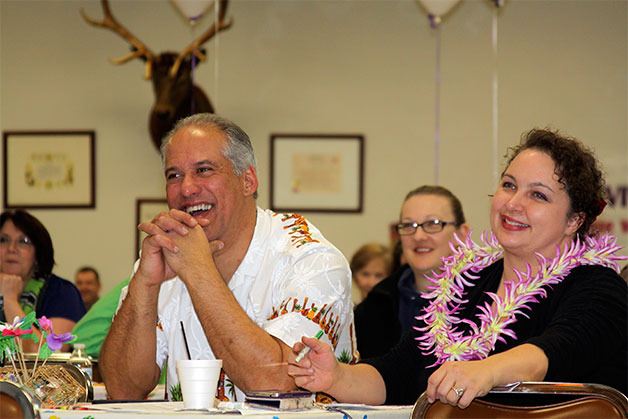Ordinarily, it’s Les MacCormick’s role to offer inspiration.
A deacon at the Oak Harbor Southern Baptist Church, he embraces the opportunity each spring at the Relay for Life of Whidbey Island to start the event with an opening prayer.
Last year, MacCormick was the one inspired when he took part in the cancer survivor lap moments after delivering his prayer.
A newcomer to cancer, he joined a purple-clad group for a walk around the track at North Whidbey Middle School for one lap and gained strength from those around him.
“I liked it,” he said. “Everybody liked me being with them. They like my attitude. They know I’m a jokester.”
(Below: Viola Fabrao starts the event with a hula dance while others participated, including event co-chair Mary Brock)


United in a fight against a deadly disease, MacCormick and others often become involved in Relay for Life to encourage others or simply tap into the positive support and energy around them.
Such a vibe was so ever present last week when the Relay for Life of Whidbey Island kicked off its 2015 fundraising campaign at the Oak Harbor Elks Lodge with one team member leading others in a hula dance.
About 50 people attended the first monthly rally that leads up to the May 29-30 event that brings communities together in the cause against cancer.
One of the biggest sources of positive energy flow came from one of the tiniest people in the room, Mary Brock, who is co-chair of this year’s event along with her husband, Kelly Brock.
“Can I count on you?” Mary Brock asked attendees on multiple occasions.
Kelly Brock’s sister lost a battle to cancer. The husband and wife team have been a part of the Whidbey event’s organizing committee since 2009.
“I couldn’t wait for tonight,” Mary Brock said. “I was so excited because it’s getting it going.”
The room was filled with laughter and smiles as high-achieving teams from last year were recognized and drawings were held to add fun to the occasion.
Focusing on the power of positive thinking and keeping things light-hearted is an intentional tactic and at times a needed distraction for the group fully aware of the serious cause it is tackling.
Most everyone in the room had a personal connection to cancer in how it impacted them, a loved one or a friend.
“We try to let the community know we’re wrapping our arms around them, too,” Mary Brock said. “We keep it positive.”
Although advances continue to be made, particularly in extending survival rates, cancer remains the second-deadliest disease in the United States, behind heart disease, with some experts expecting it to elevate to No. 1 in the coming years.
The American Cancer Society predicts more than 1.5 million new cases of cancer will be diagnosed in 2015 in this country and 589,000 Americans are expected to die from the disease this year, or about 1,600 per day.
Still, these numbers are an improvement over past years. A recent American Cancer Society report shows there has been a 22 percent drop in cancer deaths in the U.S. over the past two decades, which translates to about 1.5 million lives saved.
MacCormick, 61, considers himself fortunate for catching his cancer early.
He said an itchy sore on his nose failed to heal, so he had it checked out and learned it was melanoma.
Surgery was scheduled to remove the affected area and doctors used a skin graft to cosmetically repair his nose.
Now a year later, follow-up exams have shown no recurrence of cancer.
“I was a little scared,” MacCormick said. “I didn’t know how far they would have to go on my nose to get the stuff.
“I was glad they caught it in time. They said it if they didn’t catch it in time, it could have been a lot worse.”
MacCormick was invited to join Whidbey General Hospital’s Relay for Life team this year, which brought him to last week’s rally.
He retired five years ago from the hospital after working for 23 years as an environmental service technician.
(Below: Klatt, a surgeon from Tacoma, founded the Relay for Life in 1985 and later succumbed to cancer. The 2015 event is dedicated to his vision to end cancer.)

Forming teams and fundraising will be the big push at the next rally, from 7-8 p.m., Feb. 11, at the Elks Lodge, Mary Brock said.
The goal for this year’s “Island of Hope” campaign is to sign up 81 teams and raise $160,000 for the American Cancer Society.
The Whidbey Island event raised $131,381 last year but has fallen shy of its goal in recent years.
The target this year was set by community members who attended a November event, Mary Brock said.
Aside from being a fundraiser, Relay for Life also is designed to bring greater awareness to the disease in hopes more lives will be saved through early detection.
Gordon Klatt, a colorectal surgeon from Tacoma, came up with the idea in 1985 when he walked and ran the track at the University of Puget Sound for 24 hours to raise money and bring such awareness.
Klatt’s idea turned into a global phenomenon, which has led to nearly $5 billion raised toward cancer research.
The 2015 Relay for Life is a sobering reminder that even the fighters with the strongest wills need others to continue the battle against cancer.
Klatt was diagnosed with stomach cancer two years ago and died in August from heart failure after a two-year fight against cancer.
The 2015 Relay for Life is dedicated to the event’s founder.
“He’s the reason for the cause,” Mary Brock said. “To me, it’s more sentimental.
“We need to finish his fight.”
To learn more about the Relay for Life of Whidbey Island, go to the American Cancer Society’s website at www.relay.acsevents.org and type Whidbey into the search.

